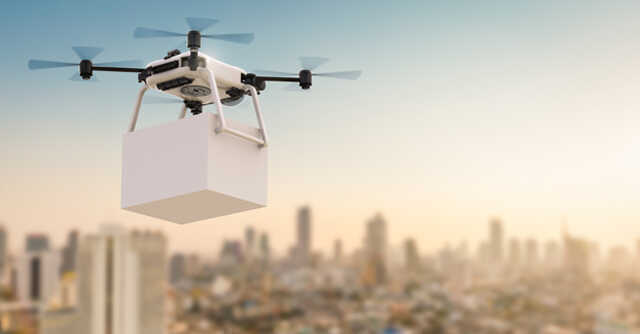
Commercial drone deliveries set to begin as firms take advantage of relaxed norms


On June 10, diagnostic centre Redcliffe Labs will start using drones twice every day to carry medical test samples from its facilities in the Uttarkashi region to its labs in Dehradun. Over the next month, the company plans to increase that supply to three flights a day. It will collect samples from patients’ homes manually, bring them to its own landing centers to load onto the drones, which will then fly them to Dehradun.
When the government liberalized drone rules in India in August last year, experts said that it would facilitate commercial drone deliveries in India. Now, firms like Redcliffe are finally ready to turn those predictions into reality. According to experts, the healthcare industry will be the first large scale adopter of commercial drone delivery.
Delivering via drones, according to Redcliffe, will cut the transport time to 88 minutes. Transferring test samples between these regions by road takes the company six to eight hours, it said. The company is also looking to expand it to other hilly regions in Himachal Pradesh, Northeast, and Ladakh. It is setting up a new lab in Shimla to enhance coverage in this region.

Among drone companies that are active in healthcare, Skye Air Mobility, has partnered with 85% of the organized diagnostic centres in the country, including Redcliffe and SRL Diagnostics, to deliver test samples and medicines using drones. They are also working with e-commerce and food delivery platforms.
“We are trying to do similar things at a commercial scale with Swiggy and Dunzo, who are planning to begin it in cities for grocery delivery,” said Ankit Kumar, chief executive officer (CEO) of Skye Air Mobility. He added that the first long-range demo flight with Redcliffe was conducted on May 19, and drone deliveries will be up to 30% cheaper and will take more than 80% less time as compared to current means.
“Delivery by road in hills can take 8 to 10 hours and requires drivers who also have to be paid. Drones can do multiple flights. This reduces the cost incurred on manpower and vehicles substantially,” he said.

According to Vivek Jhunjhunwala, partner at Deloitte India, this will be the year when drone usage becomes widespread in India. “We can see a spurt of delivery drones in the next 12-18 months,” he said. The government is actively assisting with use-cases in the healthcare industry, including delivery of vaccines, medicines and transporting human organs, he said.
Further, Dheeraj Jain, founder of Redcliffe Labs, said that drone deliveries are more likely to pick up in hilly areas, where road travel takes longer. “We want to see large parts of these hills connected more regularly. We're also trying to bring all of these package tests at a much cheaper price,” he said.
While drone deliveries have been in the works for a while, one of the big reasons why they are starting now are the liberalized drone rules. In August 2021, India introduced the Drone Rules, 2021, which replaced complex approval processes required, at the time, to fly drones beyond visual line of sight (BVLOS). The certification process is also easier now, and the government has said that it will create special drone delivery corridors as well.

“Under the Drone (Amendment) Rules, 2022, commercial drone flyers do not require a ‘remote pilot license’ to legally fly. Instead, they simply require a Remote Pilot Certificate which can be issued by an authorized remote pilot training organization,” Jhunjhunwala explained.
State governments, too, are running trials for commercial drone deliveries. The Telangana government conducted trials in September last year and used drones to transport 12 kg of medicines and 20 vials of vaccines over 6 km in five minutes. Rama Devi Lanka, director of emerging technology, Government of Telangana, said that another six-month project is being planned, where drones will carry test samples, deliver essential medicines and vaccines to remote areas in the district of Kothagudem.
That said, using drones for commercial deliveries in other industries can be more challenging. Anurag Dua, partner consulting at EY, noted that delivering drones in urban centers is going to be a different ball game. He said that for drones that fly at less than 300 feet, one of the concerns would be to determine who exactly owns the airspace above our home.

The government’s Digital Sky platform, which is a map that drone service providers need in order to navigate around cities, has also been in the works for a long time now. It will not only help firms ascertain where they can and cannot fly, it will also establish a means to track drones and establish their legality.
